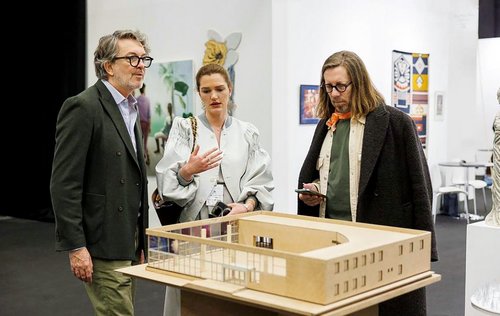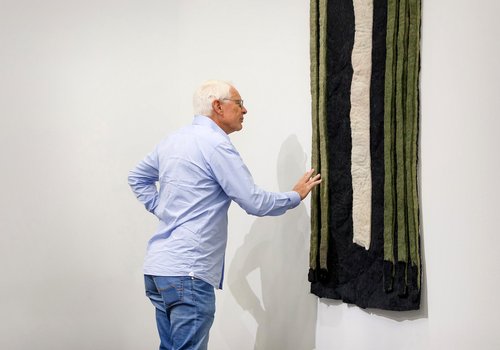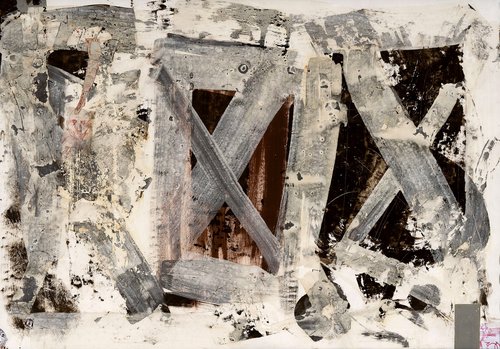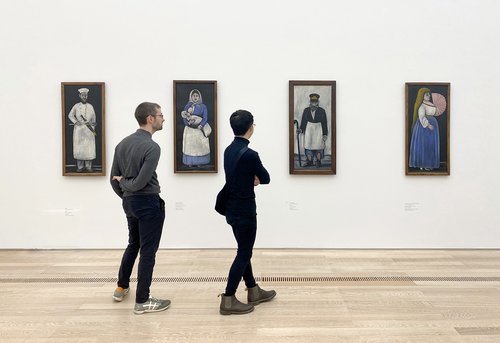Levi Deni Hangs Out her Laundry in Tbilisi
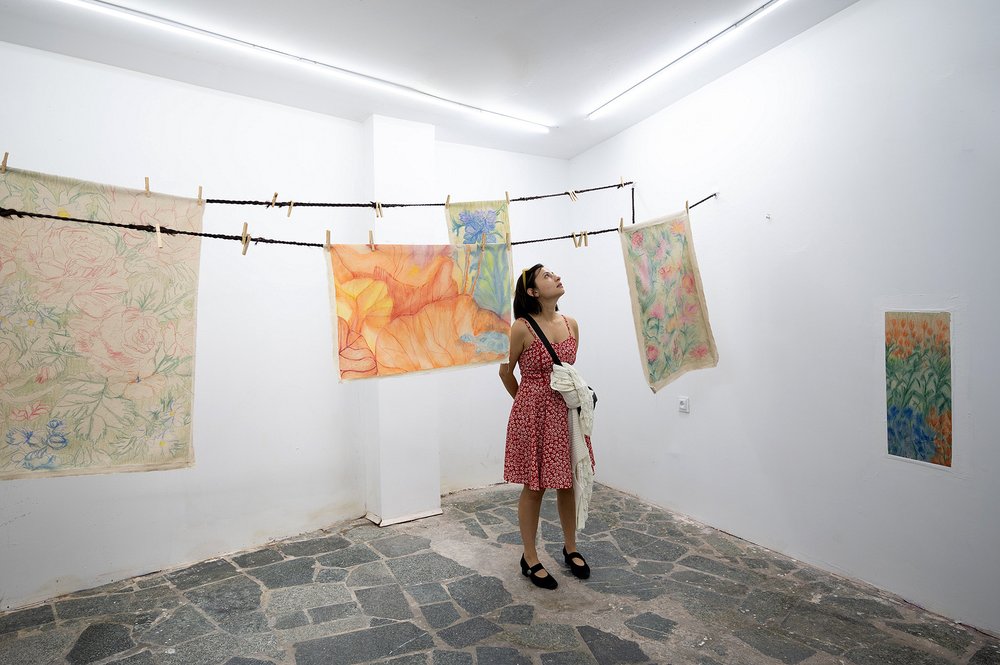
Levi Deni (Mariam Gabrichidze). Carry Me Gently. Exhibition view. Tbilisi, 2024. Courtesy of Patara Gallery
At her latest solo show in the Patara Gallery in Tbilisi Georgian artist Levi Deni has created a thought-provoking space for femininity in which childhood memories mingle with images of domestic chores. Her immersive installation explores gender-coded spaces and the contributions of women in society which are still often overlooked.
Tucked away in Tbilisi’s Vake district, cloistered from the noisy bustle of urban traffic, the brightly lit Patara gallery is located where the city’s underground tunnels intersect. The darkness and heavily graffitied walls of the subterranean passageway stand in stark contrast to the delicate floral pastel canvases that are draped over tightly braided strands of hair that pool in a bowl on the floor of the gallery. This testament to maternal love and care by local artist Mariam Gabrichidze, otherwise known as Levi Deni (b. 1992), incubates a space for femininity to expand and infiltrate the city above. Some of the paintings, which have been placed inside the walls, grow like a pale, playful mould.
“I wanted a sense of growing in the walls…to make something that could take over the city,” explains the artist.
Titled ‘Carry Me Gently’, the exhibition draws on the artist’s personal experience of navigating gender-coded spaces, identities, and work. “I feel that generally everything I see from the architecture to the way our lives are designed when I move around in the streets is coded as male because men built the houses and designed the buildings. So my question is, where is it that I can see female work?”
Reflecting on the ways feminine energy can be felt in Tbilisi, the artist continues: “It is in the food that women source or the laundry that they hang from the houses.” This deeply sensorial understanding of femininity makes tangible the smells from food cooking in a kitchen or the gentle flapping of clean clothes drying on a line.
Back in the gallery installation, braided hair spreads like makeshift clothes lines in two uneven rows across the space. They evoke the clothes lines strung from people’s balconies that can be observed throughout the city. Clothes pegs along the drooping line suspend a series of unglazed canvases that hang like drying textiles. The floral designs painted on the canvases are borrowings from childhood attire that have been lovingly stitched by the artist’s mother and grandmother.
“I found inspiration from my childhood clothes. Patterns from clothes made by my mother or grandmother that remind me of sweetness or innocence but also of their hard work,” says Deni.
She is quick to acknowledge the challenges of housework, talking of how it can be sidelined and taken for granted.
Deni’s installation offers a contemporary spin on feminine labour, blending traditional housework of laundering clothes with artmaking.
“I had this idea of a love letter written to all the female workers who did domestic chores, women who did not make it into the history books, just ordinary women washing the dishes, making breakfast, doing the laundry and folding it,” the artist says.
Deni offers us a dialogue between her own artistic work and the feminine labour of housework and caring for relatives. Through this focus on the familiar the exhibition feels accessible, these are themes and activities everyone can relate to, which is not always the case in the art world.
Contemplating the interplay between what might be perceived as masculine and overlapping it with something more recognizably feminine, Deni plays with the gendered qualities of her materials.
“I like mixing this fragile energy and masculine energy. My paintings are super sweet, and the hair makes them a bit darker,” she reflects.
Her understanding of masculinity and femininity are very personal, she explains. It is about “how I experience life through society but it is cultural as well. I am part of this culture where housework is done by women. This is what I saw when I grew up, not only in my household but in all the other houses I ever visited. So, this is what I am familiar with and what I personally witnessed.”
In her 2020 solo exhibition, ‘Warning, Fragile’, she reinforced delicate paper with glass. “I really like how the material changes”, she says, describing the act of taking something frail and strengthening it.
Her unstretched canvases reveal her fascination with material tension. Removing the stretcher bar takes away the solidity of the structure. In some instances, the canvas is reinforced by being embedded in the walls of the gallery, an inversion of the customary routine of free hanging paintings.
Here in Tiblisi, Deni opts to display her delicate works inside a solid structure, a form that cannot be moved, but one, she maintains still “contains its own magic”.
The raw, unprepared surface of the canvas and the sketchy, unfinished quality of the paint underscore the artist’s preoccupation with in-between states. Describing her interest in placing the visible and invisible together, she explains how she thinks of the lines as both existing and not being there. With social care “you see remnants, but you never see the effort that goes into it.”
Turning to the mythical aspect of hair, Deni cites how hair can connote power; the role it plays in different forms of folk magic, its use in casting spells; how locks of hair have been used as tokens of love and remembrance; even its religious connotations. The artist tells the story of Saint Nino, who formed a grapevine into a cross, fastening it with her hair to spread Christianity to Georgia. In Orthodox Christian Georgia, women wear headscarves to show their obedience to God. Deni views acts related to the covering or removal of hair as a form of subordination and sacrifice and so similar to female labour which also requires a kind of sacrifice.
Crossing the threshold of the gallery in ‘Carry Me Gently’ you enter into the artist’s personal world of womanhood, myth, and childhood. Blending memory with the present, however, is not an exercise on nostalgia. Instead, it adds to the tapestry of women’s contributions, large and small, throughout history. The exhibition tellingly conveys a sense of power and recognition for unseen acts of femininity.











